
FACULTY OF ARTS AND SCIENCES
Department of English Translation and Interpreting
ETI 431 | Course Introduction and Application Information
| Course Name |
Community Interpreting
|
|
Code
|
Semester
|
Theory
(hour/week) |
Application/Lab
(hour/week) |
Local Credits
|
ECTS
|
|
ETI 431
|
Fall/Spring
|
3
|
0
|
3
|
6
|
| Prerequisites |
|
|||||||
| Course Language |
English
|
|||||||
| Course Type |
Elective
|
|||||||
| Course Level |
First Cycle
|
|||||||
| Mode of Delivery | Blended | |||||||
| Teaching Methods and Techniques of the Course | DiscussionGroup WorkQ&ARole PlayingLecture / Presentation | |||||||
| Course Coordinator | - | |||||||
| Course Lecturer(s) | ||||||||
| Assistant(s) | - | |||||||
| Course Objectives | This course aims at theoretically introducing community interpreting, which is of utmost importance in today’s world, to students and equipping them with skills required in practicing community interpreting. |
| Learning Outcomes |
The students who succeeded in this course;
|
| Course Description | Within the framework of this course, students will first theoretically be informed on such topics as the settings of community interpreting, and relevant professional ethics. Following this, they will improve such skills as note-taking, terminology building, and sight translation that are required for community interpreting through practices and do community interpreting exercises through various scenarios like doctor appointment, teacher-parent meeting and legal procedures. |
|
|
Core Courses | |
| Major Area Courses | ||
| Supportive Courses | ||
| Media and Management Skills Courses |
X
|
|
| Transferable Skill Courses |
WEEKLY SUBJECTS AND RELATED PREPARATION STUDIES
| Week | Subjects | Related Preparation |
| 1 | Preliminaries and syllabus reading, introduction to community interpreting, role of interpreters, codes of ethics | |
| 2 | Improving note-taking and memory skills | Interpreting texts from online sources |
| 3 | Healthcare Interpreting, Role-play | Sandra Hale (2007), “Community Interpreting”, Palgrave Macmillan, pp.34- 57; Dialogues written by the students |
| 4 | Healthcare Interpreting, Role-play | Interpreting texts from online sources, Filiz Şan & Rana Kahraman Duru (2020) “Covid-19 Koşullarında sağlık çevirmenliği hizmetleri ve toplum çevirmenliğinde ‘Yeni Normal’i düşünmek”, RumeliDE Journal of Language and Literature Studies. 2020.20 (September), pp.816- 843; Dialogues written by the students |
| 5 | Court Interpreting, Role-play | Holly Mikkelson, and Renée Jourdenais (2015), “The Routledge Handbook of Interpreting”, Abingdon and New York: Routledge, pp. 187- 201, Jieun Lee (2009) When linguistic and cultural differences are not disclosed in court interpreting, pp. 379- 401, Dialogues written by the students |
| 6 | Interpreting in Police Stations, Role-play | Sandra Hale (2007) “Community Interpreting”, Palgrave Macmillan, pp.64- 79, Dialogues written by the students |
| 7 | Refugee Interpreting, Role-play | Holly Mikkelson, and Renée Jourdenais (2015), “The Routledge Handbook of Interpreting”, Abingdon and New York: Routledge, pp. 202- 216, Interpreting in a refugee context: Self-study module 3 (2009), UNHCR; pp. 12- 29, Dialogues written by the students |
| 8 | Midterm | |
| 9 | Emergency and Disaster Interpreting, Role-play | Alev Bulut& Turgay Kurultay (2001), Interpreters-in-aid at Disasters: Community Interpreting in the Process of Disaster Management, The Translator, 7:2, pp. 249-263, Dialogues written by the students |
| 10 | Interpreting in Conflict Zones, Role-play | Holly Mikkelson, and Renée Jourdenais (2015), “The Routledge Handbook of Interpreting”, Abingdon and New York: Routledge, pp. 302- 316, Dialogues written by the students |
| 11 | Sports Interpreting, Role-play | Gözde Begüm Aküzüm (2017), Translation and Interpreting in Sports Context, Academia, pp. 101- 114, Dialogues written by the students |
| 12 | Interpreting in Educational Settings, Role-play | Holly Mikkelson, and Renée Jourdenais (2015), “The Routledge Handbook of Interpreting”, Abingdon and New York: Routledge, pp. 265- 279, Mireia Vargas Urpi (2015) Dialogue interpreting in multi-party encounters: two examples from educational settings, Openstarts.units.it, pp- 107- 121, Dialogues written by the students |
| 13 | Student presentations | Student presentations |
| 14 | Student presentations | Student presentations |
| 15 | Semester Review | |
| 16 | Final Exam |
| Course Notes/Textbooks | Holly Mikkelson, and Renée Jourdenais, “The Routledge Handbook of Interpreting”, (Abingdon and New York: Routledge, 2015). ISBN: 978-0-415-81166-8 (hbk) ISBN: 978-1-315-74538-1 (ebk). |
| Suggested Readings/Materials | National Standard Guide for Community Interpreting Services, Canada: [online: http://www.saludycultura.uji.es/archivos/HIN_National_Standard_Guide_for_CI_(Canada).pdf] Selected texts from online sources |
EVALUATION SYSTEM
| Semester Activities | Number | Weigthing |
| Participation | ||
| Laboratory / Application | ||
| Field Work | ||
| Quizzes / Studio Critiques | ||
| Portfolio | ||
| Homework / Assignments |
1
|
20
|
| Presentation / Jury |
1
|
10
|
| Project |
1
|
40
|
| Seminar / Workshop | ||
| Oral Exams | ||
| Midterm |
1
|
30
|
| Final Exam | ||
| Total |
| Weighting of Semester Activities on the Final Grade |
4
|
100
|
| Weighting of End-of-Semester Activities on the Final Grade | ||
| Total |
ECTS / WORKLOAD TABLE
| Semester Activities | Number | Duration (Hours) | Workload |
|---|---|---|---|
| Theoretical Course Hours (Including exam week: 16 x total hours) |
16
|
3
|
48
|
| Laboratory / Application Hours (Including exam week: '.16.' x total hours) |
16
|
0
|
|
| Study Hours Out of Class |
14
|
3
|
42
|
| Field Work |
0
|
||
| Quizzes / Studio Critiques |
0
|
||
| Portfolio |
0
|
||
| Homework / Assignments |
1
|
24
|
24
|
| Presentation / Jury |
1
|
16
|
16
|
| Project |
1
|
32
|
32
|
| Seminar / Workshop |
0
|
||
| Oral Exam |
0
|
||
| Midterms |
1
|
18
|
18
|
| Final Exam |
0
|
||
| Total |
180
|
COURSE LEARNING OUTCOMES AND PROGRAM QUALIFICATIONS RELATIONSHIP
|
#
|
Program Competencies/Outcomes |
* Contribution Level
|
||||
|
1
|
2
|
3
|
4
|
5
|
||
| 1 | To be able to use advanced, field-specific conceptual, theoretical, and practical knowledge acquired, |
|||||
| 2 | To be able to analyze and research field-specific concepts and ideas and to interpret data individually or as a team using scientific methods, |
X | ||||
| 3 | To be able to understand and use grammatical and semantic structures of the source and target languages, |
X | ||||
| 4 | To be able to obtain information about social, cultural, and historical approaches within the source and target languages and to use this information for textual analysis and production, |
|||||
| 5 | To be able to understand and interpret written and oral texts in the source language and to transfer these texts into the target language using a semantically and functionally appropriate language, |
X | ||||
| 6 | To be able to produce creative translations and assess the translation products critically by defining the steps, strategies and problems in the translation process in the light of field-specific theoretical knowledge and skills acquired, |
|||||
| 7 | To be able to transfer the theoretical knowledge and research skills within different areas of expertise to translational act, |
|||||
| 8 | To be able to use computer-assisted translation tools and machine translation effectively at each step of the translation process, and to follow the theoretical and practical developments in these fields, |
|||||
| 9 | To be able to gain awareness of the translator’s social role, job profile, and professional ethical values and to acquire workload management skills for individual or team work, |
X | ||||
| 10 | To be able to access necessary sources to improve quality at each step of the translation process and to assess the target text in accordance with the quality objectives by using these sources, |
|||||
| 11 | To be able to establish effective oral and written communication skills both in English and Turkish, to be able to speak a second foreign language at a good level, to be able to use a third foreign language at intermediate level, |
|||||
| 12 | To be able to relate the knowledge accumulated throughout the human history to their field of expertise. |
|||||
*1 Lowest, 2 Low, 3 Average, 4 High, 5 Highest
NEWS |ALL NEWS
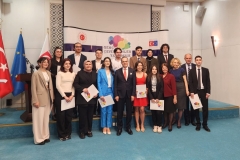
Young Translators from İzmir University of Economics Received Their Awards.
On April 16, 2024, in Ankara, the Directorate for EU Affairs hosted the Certificate Ceremony for the "Young Translators Competition," where 125
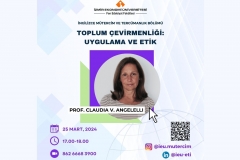
IUE Department of English Translation and Interpreting hosted Prof. Dr. Claudia V. Angelelli in the webinar titled "Community Interpreting: Practice and Ethics".
On Monday, March 25th, İzmir University of Economics Department of English Translation and Interpretation organized a webinar titled "Community Interpreting: Practice and
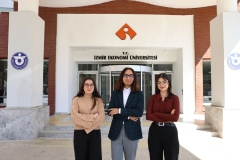
Returned to Izmir with three awards
The Young Translators Competition organized by the Ministry of Foreign Affairs Directorate for EU Affairs was marked by the success of Izmir
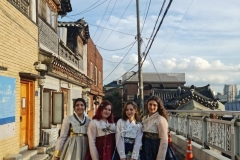
International agreements with 203 universities
Izmir University of Economics (IUE), who has signed international agreements with 203 universities with the aim of enhancing the educational opportunities offered
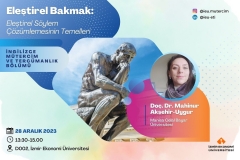
“Basics of Critical Discourse Analysis" Seminar at IUE English Translation and Interpreting Department
Izmir University of Economics, Department of English Translation and Interpreting, organized a seminar titled " Turning a Critical Eye: Basics of Critical
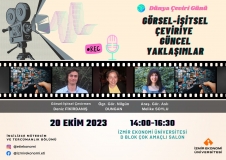
Within the framework of International Translation Day, IUE Department of English Translation and Interpreting, Faculty of Arts and Sciences, organized a panel titled "Current Approaches in Audiovisual Translation".
Within the framework of International Translation Day (September 30th), the Department of English Translation and Interpreting at Izmir University of Economics hosted
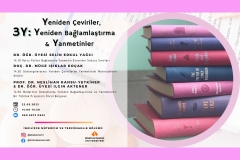
“Re-translations, Re-contextualization, and Paratexts” Panel at IUE English Translation and Interpreting Department
Izmir University of Economics, Faculty of Arts and Sciences, Department of English Translation and Interpreting organized an online panel titled "Re-translations, Re-contextualization,
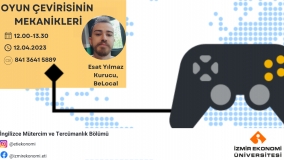
As part of the webinar series, IUE Department of English Translation and Interpreting, Faculty of Arts and Sciences, hosted Esat Yılmaz
IUE Department of English Translation and Interpreting, Faculty of Arts and Sciences, hosted Esat Yılmaz, the founder of a localization company, in



